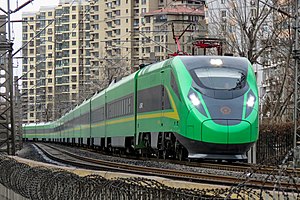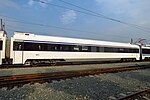China Railway CR200J
This article needs to be updated. (May 2021) |
| China Railway CR200J | |
|---|---|
 FXD1-J0010 as service D712 on Beijing-Shanghai railway | |
| Manufacturer | CRRC Nanjing Puzhen CRRC Qingdao Sifang CRRC Tangshan CRRC Zhuzhou Locomotive CRRC Datong CRRC Dalian |
| Family name | Fuxing |
| Constructed | 2017–present |
| Entered service | January 2019 |
| Number built | 144 sets (101 short, 40 long) 195 power cars, 1483 trailer cars |
| Formation |
|
| Capacity |
|
| Operators | China Railway Laos–China Railway Company Limited |
| Specifications | |
| Train length |
|
| Car length |
|
| Width | 3,105 mm (10 ft 2.2 in) |
| Height | 4,433 mm (14 ft 6.5 in) |
| Wheelbase | 2.8 m (9 ft 2 in) |
| Maximum speed | 160 km/h (99 mph) (Service) 180 km/h (112 mph) (Design) 210 km/h (130 mph) (Power car only) |
| Weight | 445t (7T formation) 1164t (16T formation) |
| Traction system | FXD1-J:Zhuzhou CRRC Times Electric or CRRC Yongji Electric water-cooled IGBT–VVVF FXD3-J:Toshiba/CRRC Yongji Electric water-cooled IEGT–VVVF |
| Traction motors | FXD1-J, HXD1D-J:CRRC Zhuzhou Electric permanent magnet synchronous motor FXD3-J:Toshiba/CRRC Yongji Electric YJ-277B/YJ-277C open inner-fan cooled 3-phase AC induction motor |
| Power output | Powercars: 5,600 kW (7,510 hp) |
| Electric system(s) | 25 kV 50 Hz AC (nominal) from overhead catenary |
| Bogies | Bolsterless air spring SW-220K (Tangshan trailer) CL-242K (Puzhen trailer) |
| Braking system(s) | Regenerative braking, electro-pneumatic composite braking system |
| Safety system(s) | CTCS2-200H/C |
| Track gauge | 1,435 mm (4 ft 8+1⁄2 in) standard gauge |
| Notes/references | |
| [1][2] | |
The CR200J Fuxing (Chinese: 复兴号; pinyin: Fùxīng Hào) is a Chinese trainset consisting of a power car paired with unpowered passenger cars operated by China Railway. It is the slowest member of the Fuxing series, and only member of Fuxing series designed for existing railways under 200km/h rather than newer high-speed railways.[3] The train was jointly designed and produced by six companies under CRRC.
These units are nicknamed Green EMU[4] or Hulk by the Chinese media,[5] or "trash cans" among the railfan community due to its green appearance.
Design and development
[edit]

The development of CR200J is initiated by China Railway Corporation to create an affordable, economical, efficient higher-speed rail. The development started on 28 August 2015. First prototype started testing on 27 April 2017. Multiple trainset was sent to China Railway Chengdu Group for dynamic test on Chengdu–Chongqing railway, Chongqing–Lanzhou railway, and Chongqing–Guiyang high-speed railway between 17 December 2017 and 4 January 2018.[6] There are multiple variants of the CR200J series made by different subsidiaries of the state-owned China Railway, and these variants are required to follow the China Standardized EMU design philosophy, thus ensuring every variants of CR200J can be compatible to each other. Another round of testing was finished on 5 August 2018.[7] On 5 January 2019, China Railway announced several new service lines, and the CR200J was formally put into service.[8]
CR200J shares similar transmission and motor system with other Fuxing series trainset despite the lower operating speed.[9][10] All CR200J trainset is painted in green colors, reminiscent of China's previous generation green-skinned train.[11] The interior design follows the design language of CR400 Fuxing EMU trains, and it's fitted with individual power outlet, Wi-Fi connection, and larger legroom.[12]
On Sichuan–Tibet railway, the plateau variant of China Railway CR200J was used. It's a type of bi-mode locomotive specifically designed for plateau operations with weather resistance.[13] A combination of diffusion and distributed oxygen systems are installed to help alleviate altitude sickness for passengers on the trip.[14]
Variant
[edit]
- FXD1-J:Electric locomotive with two-axle bogies manufactured by CRRC Zhuzhou Locomotive and CRRC Datong.
- FXD3-J:Electric locomotive with two-axle bogies manufactured by CRRC Dalian.
- HXD1D-J:Electric locomotive with three-axle bogies manufactured by CRRC Zhuzhou Locomotive for plateau operation as part of electro-diesel multiple unit CR200JS-G and electric multiple unit CR200J1-D[15][16]
- FXN3-J:Diesel-electric two-unit locomotive with three-axle bogies manufactured by CRRC Dalian for plateau operation as part of electro-diesel multiple unit CR200JS-G.[15][16]
- 25TB coaches: Specially designed 25T coaches with driver-controlled doors.
Equipment issues
[edit]In the initial operation period, the CR200J variant manufactured by CRRC Dalian had a high rate of failure. A malfunction in the engine system caused the train to slow down and stop. Out of the 23 EMUs produced by CRRC Dalian, 12 of them have broken down before 1 June 2019. According to a China Business Journal, the maintenance department of the manufacturer was held accountable for the failures. In response, CRRC Dalian cut salaries by 20 percent and recalled their trainset for repair and upgrade.[17]
Gallery
[edit]-
Exterior of the 25T coaches
-
First class interior
-
CR200J second class seats
-
Second class interior
-
The table seats located at the center of second class cars
-
Washbasin and automatic door
-
CR200J Second class sleeper
-
CR200J sleeper train at Beijing South railway station
-
CR200J trainset at Dongguan East railway station
-
Laos-China Railway CR200J for service on the Boten–Vientiane railway
See also
[edit]References
[edit]- ^ "中国动车组-复兴号CR200J型电力动车组". china-emu.cn. Archived from the original on 2018-03-23. Retrieved 2018-03-12.
- ^ "时速160公里动力集中动车组动力车_产品中心_机车_中车大连机车车辆有限公司". www.crrcgc.cc.
- ^ "Three New Types of Fuxing Bullet Trains Unveiled_Media_news Details_CRRC". www.crrcgc.cc. Retrieved 2020-06-10.
- ^ "好消息!西安-旬阳6日起开行"绿动车" 运行时间2小时左右 - 西部网(陕西新闻网)". www.cnwest.com (in Chinese). Retrieved 2020-12-04.
- ^ 新华网-张晨霖. "探访时速160公里动力集中动车组"绿巨人"" (in Chinese). Archived from the original on 2019-01-05. Retrieved 2021-06-25.
- ^ "CR200J动力集中型动车组,已经到成都铁路局开展实验-北京瑞威铁科高铁技术有限公司 江西瑞威铁科铁路工程有限公司". www.rw-tk.com (in Chinese).
- ^ "高楼迷论坛-首列CR200J动力集中型动车组抵达兰州西站开展实验". gaoloumi.com. Archived from the original on 2018-04-05. Retrieved 2018-04-04.
- ^ 新华网-张晨霖. "探访时速160公里动力集中动车组"绿巨人"". Archived from the original on 2019-01-05. Retrieved 2021-06-25.
- ^ "时速160公里动力集中动车组动力车". 中车大连机车.
- ^ 蔡杰;陈湘;李自然;黄庆;高峻 (2017). "新型动力集中动车组DC 600V列车供电装置". 机车电传动 (5): 44–47. doi:10.13890/j.issn.1000-128x.2017.05.011. ISSN 1000-128X. Retrieved 2019-04-29.
- ^ "探营复兴号新型动车组:色彩谱系更丰富,超长列车拟下月投用". 澎湃新闻. 2018-12-24.
- ^ "5月1日起,开化站始发"绿巨人"动车组列车" (in Chinese). 衢州新闻网. 2019-04-21.
- ^ Morant, Sue (August 16, 2017). "Bridging the Sichuan-Tibet gap". International Railway Journal.
- ^ "Tibet railway among new lines to open in China". international rail journal. 28 June 2021.
- ^ a b "CR200JS-G". china-emu.cn (in Chinese).
- ^ a b "CR200JS-G (video)". bilibili.com.
- ^ Chan, D. M. (2019-07-05). "Salaries cut 20% as train builder's failure rate higher than 90%". Asia Times. Retrieved 2021-03-05.










